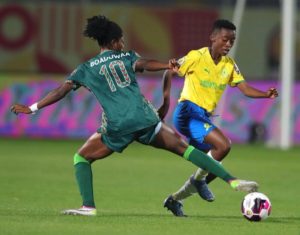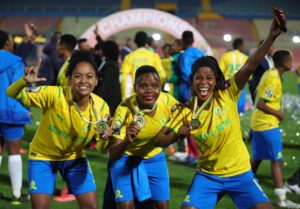Women’s Champions League: a thrilling success for African football

As Zanele Nhlapho lifted the inaugural CAF Women’s Champions League trophy, she was celebrating not only Mamelodi Sundowns, but the achievement of an entire continent.
Proponents of the women’s game in Africa have been fighting for this moment for decades, and the celebrations were well deserved at the conclusion of a thrilling tournament.
The competition has been not only a successful for the women’s game, but it was one of the best CAF showpieces in recent history. The tournament has showcased what African women’s football is all about and how far it has come.
The qualifiers, taking place over the course of the year were one-sided affairs, the bigger teams coldly brushing aside the smaller sides from smaller nations.
The tournament proper has been the opposite. It has been competitive, with every side bringing different tactical approaches to the tournament.
Whether it was the thrilling football played by Hasaacas Ladies, the highly technical and aesthetic football of ASFAR Rabat, or the machine-like organisation in the Sundowns, each game was tight and hotly-contested.

The gap in investment in teams coming into the tournament has been sizeable, but that has not manifested itself on the field.
Clubs like Hasaacas Ladies and Vihiga Queens, coming from semi-professional and amateur leagues have gone toe-to-toe with clubs like Sundowns and ASFAR, who come from professional leagues and sizable club investments.
Sundowns may have won the coveted trophy, but the real winners of the tournament have been the players themselves, who have stepped up and showcased African women’s football.
Evelyn Badu, a previously unknown quantity outside of Sekondi-Takoradi in Ghana, has taken the tournament by storm. 5 goals in 4 games from the 19-year-old was enough to secure her place as the top scorer and player of the tournament.
What sets her apart from the countless other Africans who have shined on the continental stage, is that she has performed sensationally on a platform that has a global audience.
CAF sold the rights in Africa to the competition to BEIN, Canal+ and Supersport so nearly every country on the continent is showing the tournament. For those countries outside of those broadcasters’ regions, CAF, through FIFA broadcast it for free on their YouTube channel.
This wide-ranging access cannot be boasted by any of the men’s equivalent competitions who continue to struggle to market their leagues to an international audience.
The rights were sold for pennies, and FIFA paid nothing to broadcast the games on YouTube, but the visibility that the wide platform brings is invaluable to the brand.
One only needs to look at the Women’s Super League (WSL) as a mode for building up the brand of a league. All the matches in the WSL were broadcast over many years for free on the English FA’s website
The building of an audience through free access have now led to the WSL being the most lucrative women’s league in the world.
The heights of the WSL and other major leagues across the Mediterranean are a long way away, both for the competitions and the players, but they now have the platform to garner the interest of clubs and audiences.
The path to Europe would once have been considered like passing through the eye of the needle, but the Champions League has forced open that eye with African flair.
The players are not the only ones who have benefitted from the tournament, clubs see the tournament as the launch pad to build themselves up as footballing and business entities.
Evelyn Nsiah Asare, the CEO of Hasaacas Ladies, said before the final, “We don’t have much money being invested in Women’s football. When Hasaacas lift the trophy. People will want to put their money into women’s football in Ghana.”
The governor of Vihiga County, home to the East African champions Vihiga Queens, has already pledged to build a new stadium in the county off the back of the Queens’ performance in Egypt.
Questions remain around the competition. Clubs had to entirely finance themselves travelling to both the qualifiers and the tournament proper. Hasaacas Ladies starting a public funding campaign just to get to the qualifiers in neighbouring Ivory Coast certainly is not a good look for CAF or the Ghana FA.
There are still only a handful of professional leagues in Africa, and even those are in desperate need of investment to become sustainable.
It will be a long and difficult path for those trying to force institutions to treat the women’s game with the dignity respect that it deserves. Clubs, countries, CAF and FIFA all need to play their part in bringing women’s football on par to the men’s game.

For the players though, this tournament has brought nothing but positives.
Enez Mango, the captain of Vihiga Queens said, “Most players whose dreams have been to play in Europe or other countries will get this opportunity. I think it is the best move ever.”
Beyond the importance of the visibility that the tournament provides, its true value is that it is a competition for the elite players in Africa to demonstrate their incredible talents.
Competition is what makes football thrive, and this tournament was as competitive as it comes. The scenes at the final whistle of the final were testament to that.
Player of the match Andisiwa Mgcoyi was unable to finish her interview post-match; she was so overcome with emotions. The desolation in ranks of the Hasaacas Ladies was heartbreaking, but it was impossible to watch how the Sundowns players celebrated without laughing and smiling.
The passion, unbridled joy, and South African flair as Nhlapho lifted the trophy encapsulated what the Champions League was, a glorious celebration of African football